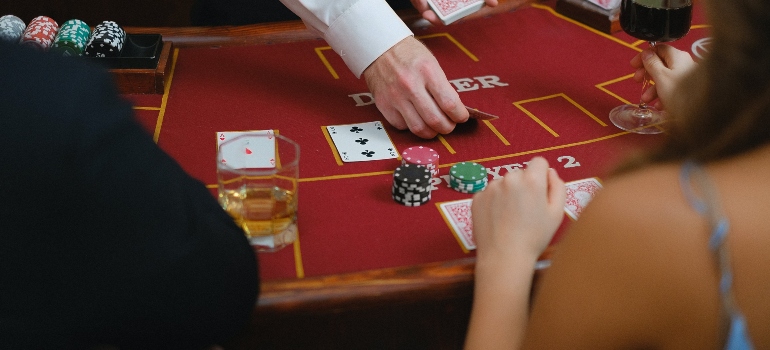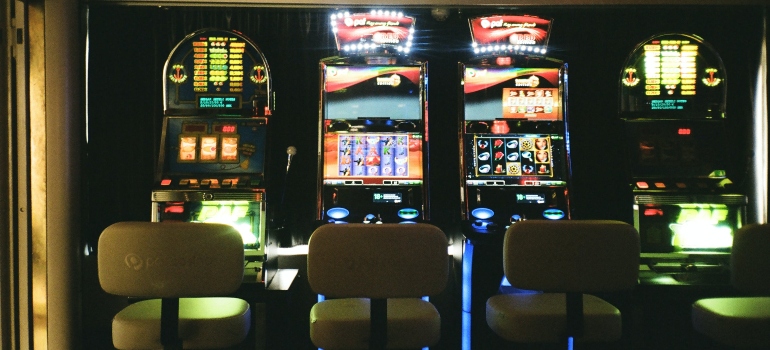Lately, we’ve been talking more about addiction, and it’s not just about drugs and alcohol. Things like gambling and shopping are also causing problems for people’s well-being. West Virginia, like other places, is dealing with the tricky challenges of these behavior problems that don’t get much attention. This blog post is here to talk about non-substance-related addictions in WV, looking into how they affect the lives of people in West Virginia. We’ll explore things like the sounds of slot machines in busy casinos and the appeal of shopping in local stores. These behaviors might not make big headlines, but they quietly affect the stories of people in the state.
Understanding Non-Substance-Related Addictions in WV
Non-substance addictions, also known as behavioral addictions, are when people get hooked on certain activities, like gambling or shopping, even when they cause problems. Unlike addictions to drugs or alcohol, these are all about things that give pleasure or relief. For example, with gambling, the excitement of risking money and the hope of winning can make the brain release a feel-good chemical called dopamine, making people want to keep gambling.

These addictions have things in common with drug or alcohol problems from a psychological viewpoint. People might need more and more of the activity to feel the same satisfaction because they build tolerance, and when they try to stop, they might get withdrawal symptoms. One big challenge is that even if they know it’s causing trouble, they can’t control the urge to keep doing it. This preoccupation with the behavior can affect daily life, relationships, and money and make life less enjoyable.
When it comes to behavior, people with these addictions develop habits. For gambling, it might mean going to casinos a lot or betting online. Shopping addiction might involve going to the mall all the time or buying a lot of stuff online. These habits become a big deal, taking up lots of time and attention, sometimes more than other important things in life.
Breaking free from these addictions is hard because they’re influenced by a mix of feelings and surroundings. Stress, boredom, or a desire for connection can push someone to do these activities, and the temporary good feelings they get make it tough to stop. It’s like a cycle that keeps going.
Gambling Addiction in WV
Gambling addiction, also known as pathological gambling or gambling disorder, is a type of behavioral addiction characterized by the compulsive need to gamble despite negative consequences.
According to studies and surveys, the prevalence of gambling addiction in West Virginia is notable, with a significant number of residents experiencing varying degrees of gambling-related problems. The availability of different forms of gambling, including traditional casinos, online betting, and lottery options, provides multiple avenues for individuals to engage in gambling activities.
The impact of gambling addiction extends beyond the individual affected, affecting families, relationships, and communities. Financial strain is a common consequence, as individuals may spend large sums of money in pursuit of the next big win. This can lead to debt, bankruptcy, and a range of associated financial difficulties.

Additionally, social and interpersonal relationships also suffer as a result of gambling addiction. People can become preoccupied with gambling and neglect their family and social responsibilities. This can impact their mental health. The stress, anxiety, and guilt associated with financial losses and the inability to control one’s gambling behavior contribute to deteriorating mental well-being. Depression is not uncommon among individuals struggling with gambling addiction.
Available Resources for Help
In West Virginia, efforts to address gambling addiction involve a combination of prevention, treatment, and support services. Here are some resources available in the state:
- Problem Gamblers Help Network of West Virginia: This helpline provides assistance for individuals struggling with gambling problems. You can contact them at 1-800-GAMBLER (1-800-426-2537).
- Gamblers Anonymous Meetings in West Virginia: Gamblers Anonymous offers support group meetings for individuals facing gambling addiction. To find local meetings in West Virginia, you can visit the Gamblers Anonymous website.
- Therapy and Counseling Services: Seek professional help from therapists or counselors specializing in addiction treatment, such as Harmony Ridge Recovery Center WV.
Shopping Addiction in WV
Shopping addiction, also known as compulsive buying disorder or oniomania is a behavioral addiction characterized by the excessive and uncontrollable urge to shop and buy items, often leading to negative consequences. Individuals with shopping addiction experience a compulsive need to make purchases, driven by emotional factors such as stress relief, a desire for self-esteem, or the pursuit of a temporary “high” associated with acquiring new items.
In West Virginia, as in many other places, shopping addiction is a rising issue that affects individuals of all ages. The state, with its diverse retail stores and the availability of online shopping platforms, provides opportunities for individuals to engage in compulsive buying behaviors. Here are some ways in which it affects the lives of people in West Virginia:
- Financial Strain: One of the most immediate and tangible effects of shopping addiction is financial strain. Compulsive buying often leads to overspending, accumulating debt, and financial instability.
- Relationship Issues: Shopping addiction can strain relationships within families. The secrecy and shame associated with compulsive buying may lead individuals to hide their purchases, causing a breakdown in trust.
- Impact on Children: Families with children may face additional challenges, as the financial and emotional consequences of shopping addiction can affect the well-being and stability of the entire family unit.
- Time and Attention Shift: Compulsive shopping can consume a significant amount of an individual’s time and attention, diverting focus away from important family responsibilities.

Addressing Shopping Addiction
Helping with shopping addiction in West Virginia means doing a few different things. First, we need to make sure people know how to recognize the signs of it. Then, we should offer support and different ways to get better. Talking to a counselor or therapist, especially using cognitive behavioral therapy for addiction, can be useful. CBT helps people figure out why they shop too much and find ways to control those feelings so they don’t shop excessively. It’s about understanding and managing the emotions that make people buy things all the time.
Additionally, for families affected by shopping addiction, seeking support from mental health professionals, attending family therapy for addiction, and financial counselors can be instrumental in rebuilding trust, fostering open communication, and developing strategies for financial recovery.
Gaming Addiction in WV
Gaming addiction, also known as gaming disorder, is a condition characterized by excessive and compulsive playing of video games, leading to negative consequences in various aspects of life. Individuals with gaming addiction often prioritize gaming over other activities, even when it interferes with their daily responsibilities, relationships, and overall well-being.
Certain groups, such as adolescents and young adults, are particularly vulnerable to gaming addiction due to factors such as peer influence, social connection through gaming, and the appeal of virtual worlds. Additionally, those with existing mental health conditions, such as depression, anxiety, or social difficulties, are more likely to use gaming as a form of coping or escaping from real-life challenges.
In West Virginia, as in many other places, gaming addiction has been on the rise, especially with the increasing accessibility of video games and online gaming platforms. The advancement of technology has made video games more accessible and engaging, so people are spending more time playing them. With the evolution of the internet, gaming has also become a social activity as users can play with each other. This creates a sense of connection and community that can be false.
The Signs of Gaming Addiction
It’s essential to recognize the signs of gaming addiction early to provide timely support and intervention. Here are some common signs:
- Preoccupation with Gaming: Constantly thinking about gaming, planning the next gaming session, or anticipating the next opportunity to play.
- Loss of Control: Inability to control the amount of time spent on gaming, unsuccessful attempts to cut back, or continuing to play despite negative consequences.
- Neglect of Other Activities: Disinterest or neglect of other hobbies, activities, school, work, or social interactions in favor of gaming.
- Neglect of Personal Hygiene: Forgetting or neglecting personal hygiene, sleep, or meals due to excessive gaming.
- Withdrawal Symptoms: Experiencing irritability, restlessness, or mood swings when not able to play, akin to withdrawal symptoms.
- Deceptive Behavior: Lying about the amount of time spent gaming or engaging in secretive behavior to hide the extent of the gaming activities.
- Negative Impact on Health: Physical health issues such as fatigue, headaches, or eyestrain due to extended periods of gaming without breaks.

How to Recover from Gaming Addiction?
Treating gaming addiction typically involves a combination of strategies. The key is to find the underlying issues that make the person seek escape from their everyday life. This will help them learn healthier ways to deal with these problems and avoid being a victim of non-substance-related addictions in WV:
- Individual Therapy: Through a personalized and focused approach, individual therapy for addiction empowers individuals to understand and address the unique factors contributing to their addiction.
- Support Groups: Joining support groups, such as those modeled after Alcoholics Anonymous, like Online Gamers Anonymous (OLGA) or Gaming Addicts Anonymous (GAA), provides individuals with a sense of community, understanding, and shared experiences.
- Education and Awareness: Psychoeducation about gaming addiction helps individuals and their families understand the nature of the disorder, its impact, and the importance of setting boundaries.
- Developing Healthy Habits: Encouraging the development of alternative hobbies and interests helps replace excessive gaming with more diverse and fulfilling activities. This can include sports, arts, socializing, or pursuing educational goals.
- Monitoring and Accountability: Using monitoring tools, such as time-tracking apps or parental controls, can help individuals stay accountable for their gaming habits. Regular check-ins with a therapist or support group provide additional accountability.
Seeking Help and Support for Non-Substance-Related Addictions in WV
Addiction is a treatable condition. With the right help and approaches that work for you, you can recover and live your life freely. Treatment centers in West Virginia offer different modalities that you can try and see which one helps you the most. For example, counseling is like having heart-to-heart chats with a professional who understands you. You talk about your thoughts, feelings, and behaviors, all to get a handle on life’s challenges.
Motivational Interviewing for addiction is another popular approach. It is a conversational style that aims to help individuals discover motivation within themselves for positive changes. It provides a platform for individuals to explore and address any uncertainties about altering addictive behaviors. MI is particularly effective in handling mixed feelings and encouraging a desire for recovery.

If your addiction is making you feel isolated, group therapy for addiction can offer a solution. It is like a meeting led by a therapist where a small group of people dealing with similar challenges get together. They talk about their experiences, help each other out, and learn from one another. This group setup makes everyone feel like they’re part of a team, which can help when you’re feeling lonely. It’s a safe place to share thoughts, get ideas from others, and create a supportive community.
Furthermore, Dialectical Behavior Therapy for addiction is like picking up skills from a toolbox of ways to accept things and make changes. It helps you get better at paying attention to the present, managing your emotions, dealing with people, and handling tough times. If you’re struggling with mood swings or doing things without thinking, DBT gives you practical skills to handle stress, manage strong emotions, and get along better with others.
Holistic Therapy
Holistic approaches think about the whole person—your mind, body, and spirit. This means trying out different things like alternative therapies, mindfulness (paying attention to the present moment), and making changes to your lifestyle to make everything better. This holistic therapy for addiction works together with regular treatments to make your mental and physical health better. Doing activities like yoga, meditation, and paying attention to what you eat helps you feel more relaxed and balanced.
Recovering from Non-Substance-Related Addictions in WV
It’s crucial for individuals and communities to be aware of the signs of non-substance-related addictions in WV and to recognize the impact they can have on well-being. Therapy for addiction is necessary for a full recovery. However, support and raising awareness are equally important. Therefore, if you or someone you know is struggling with non-substance-related addictions, remember that help is available. Reach out to therapists, support groups, and helplines to start the journey toward recovery. In unity and understanding, we can make a meaningful difference in the lives of those facing these challenges.



